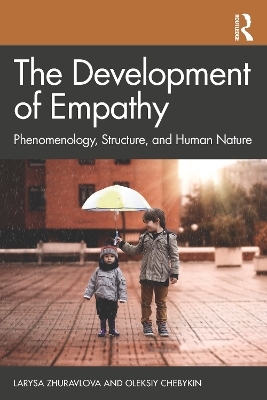
The Development of Empathy
Routledge (Verlag)
978-0-367-70273-1 (ISBN)
This thought-provoking volume offers psychological perspectives on the formation of empathy and how this determines both antisocial and prosocial behaviors in individuals. It offers a theoretically grounded and empirically proven integrated approach, helping readers gain a holistic understanding of human nature and the need for empathic interaction between people.
Larysa Zhuravlova and Oleksiy Chebykin study the evolution of empathy, peculiarities from birth to old age, and its role in the moral and spiritual development of a person. Key sections explore theoretical and methodological principles of empathy research, the genesis and development of human empathy, the phylogenetic preconditions for empathy, the psychological features of the ontogenesis of empathy, the key factors in personality development, and the experimental study of empathy.
Considering a vision of a society based on empathic relationships, which could deter discrimination, help resolve environmental issues, harmonize interpersonal relationships, and resolve conflict, this new text is for advanced students of developmental and educational psychology. It will have broad appeal across academic and applied discipines in social and developmental psychology, education, the helping professions, and human development.
Larysa Zhuravlova is Doctor of Psychology, Professor, Academician of the National Academy of Higher Education of Ukraine, and Head of the Psychology Department at the Polissia National University. Oleksiy Chebykin is Doctor of Psychology, Professor, Academician of the National Academy of Educational Sciences of Ukraine, founder of the Southern Scientific Center in Odessa, President of the University of South Ukraine, and Head of the Department of Theory and Methods of Practical Psychology.
Introduction
1 Theoretical and methodological principles of empathy research
1.1. Historical overview, current status, and future of empathy research
1.2. Methodological basis of studying human empathy
1.3. Experience as a meaningful basis of the empathic processes
1.4. Conclusions
2 Conceptualizing the genesis and development of human empathy
2.1. Conceptual basis of the empathy phenomenon
2.2. Structural-dynamic model of elementary and personalized meaning empathy
2.3. Features of transfinite empathy
2.4. Empathy from the standpoint of the psychology of attitudes and activities
2.5. Conclusions
3 Phylogenetic preconditions for the development of human empathy
3.1. Evolutionary development of natural empathy
3.2. Microgenesis mechanisms of natural empathy
3.3. Ontogenetic development of natural empathy
3.4. Conclusions
4 Psychological features of the ontogenesis of human empathy
4.1. Development of empathy in infants
4.2. Dynamics of the development of personalized-meaning empathy in early childhood and preschool age
4.3. Features of empathic attitudes of children at primary school age
4.4. The dynamics of empathy in teenagers and adolescents
4.5. Empathy in adulthood
4.6. Comparative analysis of the ontogenetic development of empathy
4.7. Conclusions
5 Determining factors of personality development in the experimental study of empathy
5.1. Study of individual and typological correlates of empathy
5.2. Empathy and self-awareness
5.3. Correlation between the development of empathy and value-based needs
5.4. Family as an important culturogenic factor in the actualization and development of empathy
5.5. Conclusions
6 Actualization and the development of empathy
6.1. Early school age as a sensitive period for the development of effective forms of empathy
6.2. Development of empathy in junior schoolchildren
6.3. Conclusions
Conclusions
Appendix A: Empathy test for younger schoolchildren
Appendix B: Empathy test for teenagers and adolescents
Appendix C: Empathy test for adults
| Erscheinungsdatum | 30.06.2021 |
|---|---|
| Zusatzinfo | 21 Tables, black and white; 24 Line drawings, black and white; 24 Illustrations, black and white |
| Verlagsort | London |
| Sprache | englisch |
| Maße | 156 x 234 mm |
| Gewicht | 460 g |
| Themenwelt | Geisteswissenschaften ► Psychologie ► Entwicklungspsychologie |
| ISBN-10 | 0-367-70273-8 / 0367702738 |
| ISBN-13 | 978-0-367-70273-1 / 9780367702731 |
| Zustand | Neuware |
| Haben Sie eine Frage zum Produkt? |
aus dem Bereich


